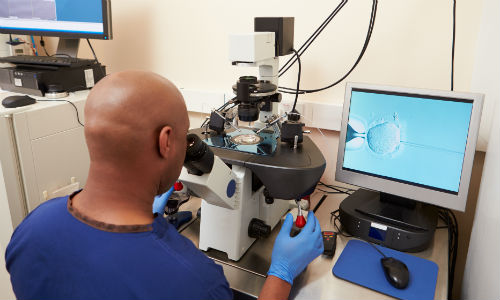Male fertility | Frequently Asked Questions
- Overview
1. What fertility treatments are available to men?
Sometimes simple lifestyle advice is all that is required for men to improve their fertility, such as stopping smoking or limiting the consumption of alcohol. Other more specific fertility issues, such as reversing a vasectomy or sperm retrieval are surgical procedures which can help you to have biological children.
2. What causes fertility issues in men?
In many cases there is no identifiable cause for fertility issues in men. In others there is a history of injury or surgery to the testes. Some medical treatments such as chemotherapy can also affect men’s fertility. And in some circumstances there is a genetic cause.
3. At what age is a man most fertile?

There is some evidence that sperm counts decline with age but some men can be fertile into old age.
4. Do older men have a higher risk of having a child with Downs Syndrome or with disabilities?
The age of the male who provides the sperm has no effect on the health of the foetus. The age of the female, however, can have an effect, with the chances of having a child with Downs Syndrome increasing significantly with the age of the mother.
5. Could fertility treatment damage my reproductive organs?
There is risk of infection with any surgical procedure which could have negative impact on your reproductive organs. Your Consultant will be able to discuss this risk with you if treatments such as surgical sperm retrieval or vasectomy reversal are appropriate for you. For many men surgery is not required.
6. What drugs are used and what are the potential side effects?
Men are not usually given prescribed drugs to improve fertility. Women are sometimes given a course of drugs to encourage ovulation.
7. Can fertility treatment help me to achieve an erection?
There are medicines that are available to help men achieve an erection but these will usually not be prescribed by a fertility clinic. If you think you are experiencing erectile dysfunction you should speak to your GP about the options available.
8. What are the typical success rates of fertility treatment?
The success of fertility treatment varies depending on the treatment and will greatly depend on the individual circumstances of the couple.

9. Does fertility treatment hurt?
If you have a vasectomy reversal or surgical sperm retrieval you will be under general anaesthetic so will feel no pain during the procedure. Any pain felt after the treatment can usually be relieved by over the counter medicines such as paracetamol.
10. How invasive is fertility treatment?
Fertility treatment can be viewed by some as invasive, because it relates to your sexual organs. However the procedures, such as surgical sperm removal or vasectomy reversal are very fast and pain after the treatment can usually be managed with over the counter drugs such as paracetamol.
Both of these procedures will involve a general anaesthetic but will usually take no longer than an hour and a half. Good medical and nursing support throughout can help you feel more comfortable.
11. Is fertility treatment confidential/discrete?
Yes, completely. Your details are stored in secure files and will never be released to third parties.
12. Does my partner need to be there when I have treatment?
Fertility treatment is usually undertaken as a couple so it is typical for the female partner to be there as you undertake the treatment.
13. How long does fertility treatment take?
A vasectomy reversal will usually take between an hour and an hour and a half. Surgical sperm retrieval will take around 20 minutes. Once these procedures are done, further treatment for the couple, which may include IVF, IUI or ICSI will vary in time taken. Every couple’s journey to pregnancy is different. Some people undertake several unsuccessful cycles of treatment before having success.
14. How soon after treatment will I know if it’s been successful?
You will have to wait around two weeks to find out if a vasectomy reversal has been successful. Other treatments will usually have an outcome about two weeks after the insemination has been performed or embryo or embryos have been replaced in the womb.
Last updated Monday 23 October 2017
First published on Monday 2 November 2015

